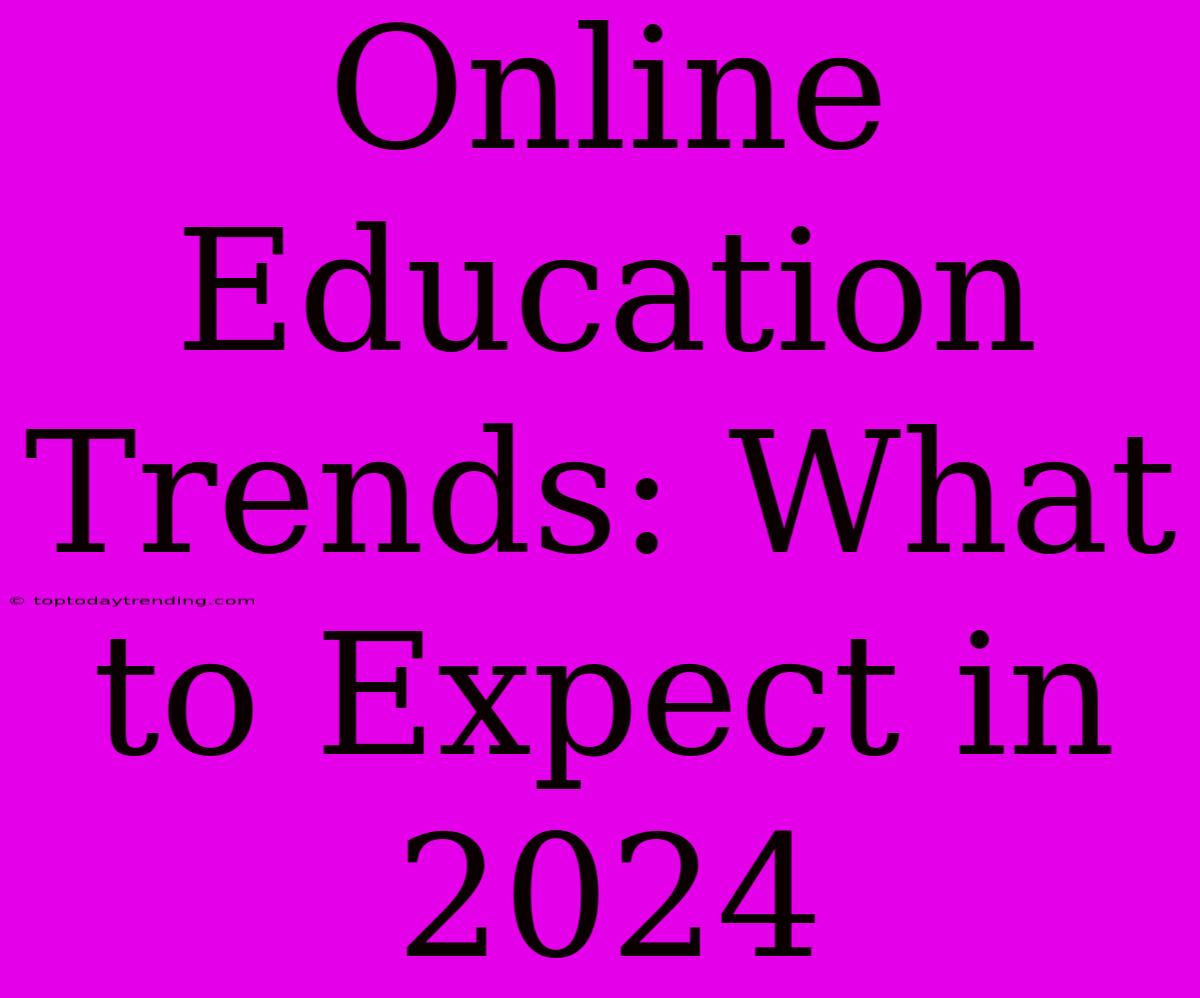Online Education Trends: What to Expect in 2024
The world of education is constantly evolving, and 2024 promises to be a year of exciting advancements, particularly in the online learning landscape. From emerging technologies to shifting learning preferences, here's a glimpse into the key trends shaping the future of online education:
1. The Rise of Micro-Learning: Bite-Sized Knowledge for Busy Learners
Micro-learning is gaining momentum, offering learners bite-sized, focused content that fits into busy schedules. Instead of lengthy courses, expect to see more short, interactive modules and videos tailored to specific skills and topics. This trend caters to the modern learner's desire for flexibility and immediacy.
Key benefits of micro-learning:
- Increased engagement: Shorter formats keep learners engaged and prevent information overload.
- Accessibility: Learners can access content on-the-go, via mobile devices.
- Targeted learning: Focus on specific skills allows for faster skill development.
2. Personalized Learning Experiences: Tailoring Education to Individual Needs
Personalized learning is becoming increasingly important, with technology enabling educators to tailor educational pathways to individual student needs. This could mean personalized learning paths, adaptive assessments, and AI-powered tutors that adjust difficulty levels and learning strategies.
Key elements of personalized learning:
- Data-driven insights: Tracking student progress and providing feedback based on real-time data.
- Adaptive learning platforms: Adjusting content and pace according to individual learning styles and comprehension.
- Personalized recommendations: Recommending relevant resources and courses based on student interests and goals.
3. Virtual Reality (VR) and Augmented Reality (AR): Immersing Learners in New Worlds
VR and AR are revolutionizing online learning by offering immersive and interactive experiences. VR classrooms provide simulations of real-world situations, while AR overlays digital content onto the physical world, enhancing the learning experience.
Potential applications of VR and AR in education:
- Interactive simulations: Experience historical events, medical procedures, or complex scientific concepts in a safe and engaging way.
- Field trips and virtual tours: Explore museums, archaeological sites, or distant planets without leaving the classroom.
- Interactive learning games: Make learning fun and engaging through gamified experiences that reinforce key concepts.
4. Focus on Soft Skills and Future-Ready Skills: Preparing Learners for the Jobs of Tomorrow
As the job market evolves, soft skills such as communication, critical thinking, and collaboration are becoming increasingly important. Online education platforms are recognizing this shift by offering courses that develop these essential skills.
Key soft skills in demand:
- Communication and collaboration: Effective communication and teamwork are crucial for success in the modern workplace.
- Problem-solving and critical thinking: The ability to analyze problems, think critically, and find creative solutions.
- Adaptability and resilience: The capacity to embrace change, learn new skills, and adapt to evolving demands.
5. The Rise of "Edutainment" : Making Learning Engaging and Entertaining
Edutainment combines education and entertainment to create engaging and enjoyable learning experiences. This trend embraces the power of storytelling, games, and interactive content to make learning more fun and effective.
Examples of Edutainment in online learning:
- Interactive documentaries and simulations: Bringing history, science, and other subjects to life through engaging visuals and narratives.
- Learning games and quizzes: Reinforcing knowledge and making learning interactive and enjoyable.
- Educational podcasts and audiobooks: Making learning accessible on-the-go and offering diverse perspectives.
6. Expanding Access to Education: Bridging the Gap in Global Learning
Online education has the potential to democratize learning, breaking down geographical barriers and offering access to quality education for all.
Key initiatives fostering inclusivity:
- Open Educational Resources (OER): Free and openly accessible learning materials available to anyone.
- Global partnerships: Connecting educators and learners across borders to facilitate knowledge sharing and collaboration.
- Affordable online learning options: Making quality education accessible to students from diverse socioeconomic backgrounds.
7. The Importance of Community Building: Fostering Connections and Collaboration
Online learning communities provide valuable opportunities for learners to connect, share ideas, and support each other.
Key elements of online learning communities:
- Discussion forums and chat groups: Providing spaces for learners to interact and ask questions.
- Collaborative projects and assignments: Promoting teamwork and shared learning experiences.
- Mentorship and peer support: Offering guidance and encouragement to learners through established communities.
Conclusion
The future of online education is bright, filled with innovative trends that promise to revolutionize the learning experience. As we embrace these advancements, we can create a more accessible, engaging, and impactful educational landscape for all.

